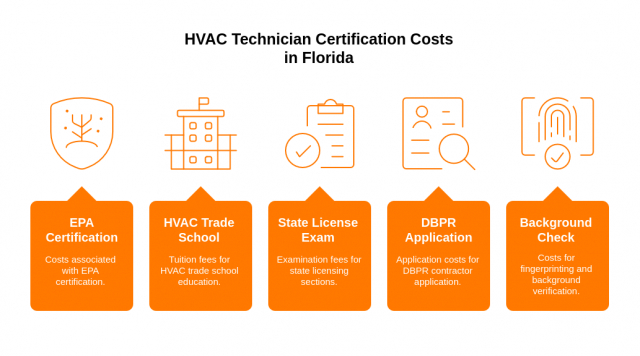How to Become an HVAC Technician in Florida
Thinking about starting a career in HVAC in Florida? You're not alone-and you're definitely in the right place. With year-round air conditioning needs, frequent heat waves, and one of the fastest-growing populations in the U.S., HVAC professionals in Florida enjoy consistent demand and strong job security.
This step-by-step guide explains how to become an HVAC technician in Florida based on the latest rules from the Florida Department of Business and Professional Regulation (DBPR)[^1] and the U.S. Environmental Protection Agency (EPA)[^2].
Do You Need a License to Work in HVAC in Florida?
Yes. Florida requires HVAC professionals to be either registered or certified depending on where and how they work.
| License Type | Scope of Work | Regulated By |
|---|---|---|
| Registered | Local work only; not valid statewide | Local Jurisdictions |
| Certified | Valid across all of Florida | Florida DBPR[^1] |
Additionally, EPA Section 608 certification is required federally if you handle refrigerants.
"Technicians who maintain, service, repair, or dispose of appliances that could release ozone-depleting refrigerants into the atmosphere must be certified under EPA Section 608." - EPA.gov[^2]
Step-by-Step: How to Become an HVAC Tech in Florida
1. Meet Minimum Requirements
- Be at least 18 years old
- Hold a high school diploma or GED
- Be legally eligible to work in the U.S.
- Pass a background check[^3]
2. Get EPA Section 608 Certified
You must earn EPA 608 certification if you will handle refrigerants. There are 4 types:
| Type | Covers |
|---|---|
| Type I | Small appliances (under 5 lbs) |
| Type II | High-pressure systems (residential/commercial) |
| Type III | Low-pressure systems (chillers) |
| Universal Certification | All of the above |
You can prepare for and take this exam through most Florida HVAC schools or online via proctors like ESCO Institute.
💡 Want a full breakdown?
Check out our EPA 608 Certification Guide for test tips, study resources, and how to get certified fast.
3. Choose a Training Path
Florida does not require a degree, but completing a state-approved program increases your job options and reduces licensing requirements.
| Path | Duration | Notes |
|---|---|---|
| Apprenticeship | 4-5 years | Earn while you learn |
| Trade School / Technical College | 6-24 months | Focused HVAC diploma or degree programs |
"Florida apprenticeships are registered through the Florida Department of Education and include paid, hands-on experience." - FLDOE[^4]
💡 Looking to boost your pay and stand out in Florida's HVAC market?
Consider getting NATE certified. It's a nationally respected credential that shows employers you know your stuff-and certified techs often earn more.
4. Register as an HVAC Technician (Optional but Common)
Many HVAC workers start as technicians under a licensed contractor before becoming licensed themselves.
- Register with local jurisdictions if working under a registered contractor
- No state test required at this level
This is a good path if you're starting out and want to build hours toward full certification.
5. Apply for a Certified HVAC Contractor License
Once you've gained 4+ years of experience (or equivalent education + experience), you can apply to become a Certified Air Conditioning Contractor.
Steps:
- Submit application via DBPR: myfloridalicense.com
- Complete background screening[^3]
- Provide proof of experience and/or education
- Carry liability insurance & worker's comp coverage
- Pass the state HVAC license exam[^5]
Estimated HVAC Licensing Costs in Florida
| Item | Estimated Cost |
|---|---|
| EPA Certification | $40-$100 |
| HVAC Trade School | $2,000-$15,000 |
| State License Exam | ~$135 per section |
| DBPR Contractor Application | ~$355 |
| Fingerprinting / Background Check | $60-$100 |
| Total Startup Cost (range) | $2,500-$16,000+ |

Other Florida Trades
- Electrician in Florida
- Plumber in Florida
- Welder in Florida
- Carpenter in Florida
- Solar Installer in Florida
- Mold Inspector in Florida
FAQs
Do I need a license to work HVAC in Florida?
Yes, either as a registered or certified contractor. EPA 608 certification is also required for refrigerants.
Can I start working HVAC without a license?
Yes, if you work under a licensed contractor and register locally as a technician.
Is EPA 608 required in Florida?
Yes. It's a federal requirement enforced by the EPA for anyone handling refrigerants.
How long does it take to become licensed?
Anywhere from 6 months (for entry-level work) to 4+ years for full contractor licensing.
Citations
[^1]: Florida Department of Business and Professional Regulation (DBPR): https://www.myfloridalicense.com
[^2]: U.S. Environmental Protection Agency - Section 608 Technician Certification: https://www.epa.gov/section608
[^3]: Florida Department of Law Enforcement - Background Screening: https://www.fdle.state.fl.us
[^4]: Florida Department of Education - Apprenticeships: https://www.fldoe.org/academics/career-adult-edu/apprenticeship-programs/
[^5]: PSI Exams - Florida HVAC Contractor Testing: https://candidate.psiexams.com
[^6]: U.S. Bureau of Labor Statistics - HVAC Mechanics and Installers: https://www.bls.gov/oes/current/oes499021.htm
HVAC Technician Salary & Job Outlook
Based on BLS occupation: Heating, Air Conditioning, and Refrigeration Mechanics and Installers (49-9021)
Data Year: 2024 • Florida
Mean Pay (2024)
Wage Percentiles
Florida vs U.S.
Percent difference vs U.S.
Employment Outlook
Employment: 38,290 jobs
Additional Details
- Employment per 1,000 Jobs
- 3.90
- Employment RSE
- 6.0%
- Total Employment (BLS sample)
- 38,290 jobs

Meet the author: Brad Fishbein is a Florida Licensed Mold Assessor and council-certified Microbial Investigator. He’s the founder of TradeCareerPath.com and has completed over 5,000 mold inspections since 2009. Brad now helps homeowners and tradespeople make smart decisions about mold, licensing, and skilled career paths.
Notice an update we should make?
We strive for accuracy. Contact us here if you see incorrect or outdated info on this page.